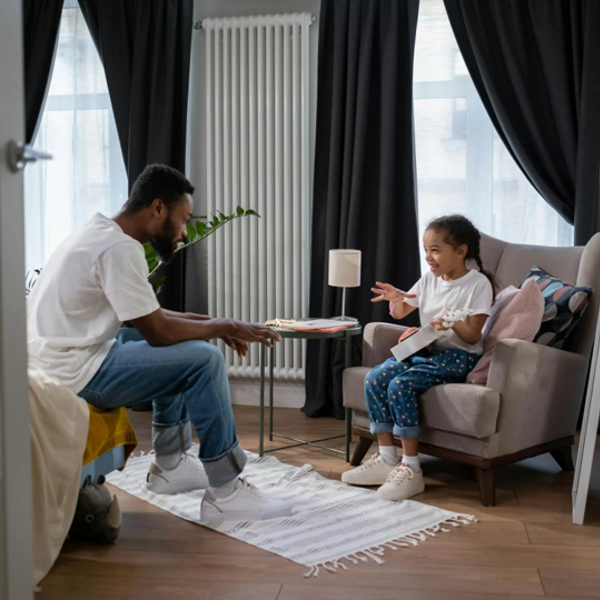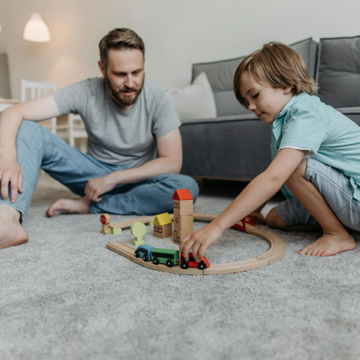Foster Care Fortnight, the UK’s biggest campaign to raise awareness of fostering, is running from 12 – 25 May. The theme for 2025 is The Power of Relationships, celebrating the importance of supportive, positive, strong relationships, which can be transformative to the lives of children and young people.
Creating a nurturing environment for children and young people in foster care goes beyond meeting physical needs — it's about building trust, consistency, and meaningful connection. Whether you're a foster carer or a professional supporting a child or young person, strong relationships are at the heart of positive outcomes.
In this blog post, three of our Fosterline Advisors share their own experiences of powerful relationships in the fostering community.
“He slid a picture across the table and said, “This one’s you — you always wear boring shoes!”
“As a social worker, one of the most powerful lessons I’ve learned is that meaningful connection often comes from the smallest, most ordinary moments.
I remember working with a 10-year-old boy who had lived in multiple foster homes. He was guarded, quiet, and had built thick emotional walls. During my visits, I noticed he loved to draw but never wanted to talk much. So, instead of pushing for conversation, I started bringing sketchbooks and sat next to him while he drew. I’d doodle too — badly, I might add — but it became our routine.
After a few weeks, he slid a picture across the table and said, “This one’s you — you always wear boring shoes.” We both laughed, and something shifted. It was a small moment, but it marked the start of trust. From there, the conversations started to flow more naturally — not always deep, but honest.
The lesson? Children in care often respond best when we slow down, drop the agenda, and just be with them. Consistent presence, genuine interest, and shared experiences — even quiet ones — lay the foundation for healing and relationship.”
“Over time they realised I was there to support them, help them be listened to, and help meet their needs”
“Relationships have always been the key to my social work practice over the past 25 years. I have found that making and allowing time to build relationships has enabled me to build strong working relationships with both understanding and give and take.
A memorable example was when I used to work with care-experienced young people living in supported accommodation at 16 or 17 years old. They were often scared, angry, and confused as living independently was harder than they expected, especially when there were financial issues. I used to role model how to have an appropriate professional relationship. If they phoned and shouted or swore because something had gone wrong, I would calmly tell them I would call them back when they had time to calm down a little and reassure them I would help. Over time, they began to ring after they had calmed down so we could problem solve together and then move on to any other issues we needed to discuss. This helped them to both build a positive trusting relationship with not only me but others who supported them, as they were much calmer in their interactions with colleagues.
Often the young person and I had competing priorities, but I decided to come to an agreement that I would always prioritise one of the tasks they wanted / needed me to be involved in, for each one that the service dictated needed to be completed. I always encouraged the young person to say which task this was. By enabling them to be involved in these choices, over time they realised I was there to support them, to help them be listened to, and help meet their needs - not just to monitor them. This helped to build strong trusting relationships, and empowered the young people to start working towards completing key tasks, such as completing applications or going to important appointments, themselves with my support.”
“How individuals had spoken or spent time with him mattered just as much as any decisions they made”
“I have learnt so much about the power of relationships within my many years as a social worker and within my own life experiences. Sharing files with a teenager who had spent many years in care was a learning and at times painful experience as a newly qualified worker which has always stayed with me - the look of delight he had at seeing a baby picture of himself for the first time and the memories he unlocked of many different social workers, foster carers, and others, as we went through the information, gave me real insight into the impact of powerful relationships.
Whilst details of some events were hazy for him, he had vivid positive or negative associations with various individuals as to how they had made him feel. Details of how they had spoken to him or not, or spent time with him or not, mattered to him as much as any decisions they may have made. I learnt that enabling those I worked with, including young people, foster carers and colleagues, to be seen, heard and valued, was key to building positive relationships.
Fosterline is a small team committed to building positive relationships with the fostering community. This is often done within the timeframe of a single phone call, live chat, or email response. Treating callers with respect and care, enabling people to be heard, avoiding judgement, and remaining child-focused whilst offering guidance and reassurance, are all key components. Our feedback from callers confirms that the information we provide is helpful and our response timely. However, the frequent comments about how the interaction has made them feel - for example, clearer, less anxious, more confident, valued, and understood - continue to underline the impact of powerful relationships.”




